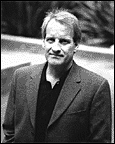Professor Finds Skeletons in Goethe's Closet and Upsets Parts of Europe in Doing So
By Kathleen Scalise, Public Affairs
Posted August 25, 1999
 Professor W. Daniel Wilson. Peg Skorpinski photo. |
"One East German writer said I should be drowned," Wilson said from his campus office. His stack of newspaper clippings, three inches thick, documented some extreme reactions to his latest book, titled in English "The Goethe Taboo: Protest and Human Rights in Classical Weimar."
In Europe, Wilson's book has stirred up emotions ranging from chagrin and embarrassment to outright anger and open anti-Americanism. This month, on the eve of the 250th anniversary of Goethe's birth, Wilson reflects on what it was like to challenge the image of one of Europe's greatest cultural icons.
Explain who Goethe is and what he means to his native Germany.
There is almost nothing in other countries like the role that Goethe plays for German national identity. He is the central icon of German culture. At crucial junctures in German history, Goethe has represented everything a "better Germany" stands for.
As far as national pride is concerned, who is Goethe equivalent to?
Even Shakespeare doesn't play anything like the role for British identity that Goethe does for Germany. You might compare Goethe in this country to Jefferson, but I think Americans are much more relaxed talking about Jefferson and his conflicts on slavery than Germans are about any kind of political questioning of Goethe.
You found Goethe's humanitarian principles did not always match his actions when he was a top-level administrator in the German prinicipality of Saxe-Weimar. What did you discover?
I discovered many instances of political repression. For example, Weimar sold prisoners to the British to serve as soldiers in the American War of Independence. Goethe signed off on the authorizing documents despite clearly established legal principles that a criminal was to be punished according to set laws -- for example, seven years in prison for theft. If you change that to a potential death penalty, then that is a clear breach of these principles.
Anything else?
Another area that was completely unknown: Peasants who protested against their feudal duties were punished severely. Even within the Weimar government, legal experts objected to this punishment because it violated written agreements. Also, Goethe approved the financing of police spies at the University of Jena, though the professors had condemned this practice on legal and moral grounds.
This new information took German experts by surprise. With so much already written about Goethe over the centuries, how could the experts have missed this?
It is surprising and embarrassing for some people, because Goethe has been studied almost like no other person. Most of these documents have remained unknown because they are not writings of Goethe himself, but items he signed off on, indicating he took part in making the decision. There are thousands of such documents that scholars simply have not dug into. I think one of the reasons is that political conflict in the state that gave rise to Weimar classicism has been a very sensitive topic that German scholars have avoided.
You compare your new findings on Goethe to Thomas Jefferson's inconsistencies on slavery. Are these two transgressions of ideals equivalent?
They're comparable in the sense that they both show the difficulties of remaining true to enlightenment principles. Jefferson was opposed to slavery, and yet he owned slaves; Goethe advocated liberal policies, and yet he violated them repeatedly.
Why did Goethe deviate from his principles?
He wasn't a democrat. I think he and others in Weimar were more concerned with the liberal public image of the duchy than they were with political rights. They didn't tolerate criticism of the duke, and in the period of the French Revolution, they didn't tolerate much political discourse at all, like other governments. One of the most important findings of the book is that Weimar was a rather typical German state of the 18th century. But even that statement challenges the prevailing image of Weimar as a sort of political oasis.
What would Goethe have thought of the taboo surrounding his image -- of being too sacred to be touched?
I'm not sure he would have been surprised, because early on Goethe began to cultivate his image in the public. He asked for letters back in politically sensitive areas and destroyed them. I would imagine that he would find arguments to justify what he did: he was only doing his job, maintaining security and order, principles that have been used through the centuries by authoritarian governments to justify repression.
![]()
![]()
August 25 - 31, 1999 (Volume 28, Number 3)
Copyright 1999, The Regents of the University of California.
Produced and maintained by the Office of Public Affairs at UC Berkeley.
Comments? E-mail berkeleyan@pa.urel.berkeley.edu.